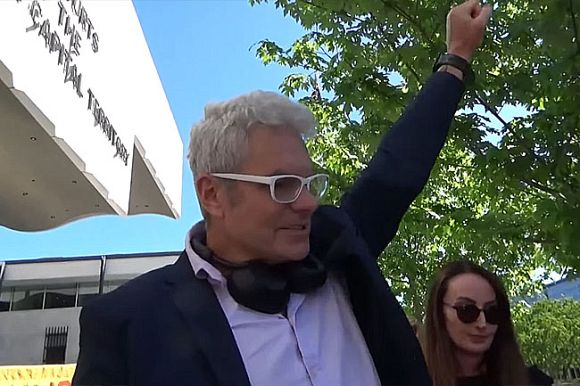This article was a finalist in the 2024 IA Writing Competition Most Compelling Article category. You can read the excellent work of all our finalists HERE.
*****
A review of David McBride's autobiography has missed the point of the whistleblower's story and leans more towards character assassination, writes Therese Taylor.
DAVID MCBRIDE has been on trial for leaking Australian military secrets about war crimes in Afghanistan. He is now awaiting sentencing. Whatever the outcome, his life will never be the same.
‘All trials are trials for one’s life...’
So, what was McBride’s life like before he became Australia’s whistleblower?
McBride's autobiography, The Nature of Honour, takes us through his privileged childhood, as the son of a prominent medical specialist, to his roving career, always seeking new roles and the final crisis of his work as a legal officer in the Australian Army in Afghanistan.
Throughout this memoir, one senses how David McBride has contended his impulsive nature and his desire to excel in environments where he did not quite fit in. Like many Australians, he has an issue with alcohol. Other parts of his life are exceptional, such as his education abroad and his ardent love of England, which saw him serve in the British army.
David McBride’s protest against war crimes in Afghanistan was the protest of an insider, who wanted to uphold the values of the society which he served. The memoir as a whole explains his conservative outlook and why he persisted to the end.
The Nature of Honour very effectively describes the beauty of traditional institutions, but also their flaws. In his account of Kings School, ‘a strange blend of English public school and some of the best and worst things about Australia’, McBride shows how the school gifted some students with resilience and discipline, but destroyed others: ‘... many of the boys carried mental scars from their time at King’s for the rest of their life’.
The memoir gathers pace in the last section recounting McBride’s service in Afghanistan.
He describes the austere dignity of Afghan culture and also the darkening horror of the foreign occupation:
‘We lived behind high walls, only venturing out in armed vehicles and anyone taken by us back into our bases never returned.’
As he notes of two Afghan men who disappeared at a U.S. military base:
‘... probably just captured, tortured and killed, then buried’.
The story ends abruptly, before the events which would eventually put David McBride on trial in Australia. Presumably, he cannot give his version of events until the legal actions are concluded. One can complete the missing last chapter by reading media stories about The Afghan Files.
Reviews and controversy
The Nature of Honour has been featured in the Australian Book Review (ABR), with a review written by Associate Professor Kevin Foster of Monash University.
This almost embittered critique takes a negative view of David McBride’s life, his values and his way of telling his own story. The review states that ‘it would be hard to conjure a more entitled, self-interested, establishment figure than McBride’. The conclusion is that McBride has always pursued ‘a career dedicated to self-interest’.
This is odd reasoning. If David McBride was driven by self-interest, he surely would have kept his mouth shut about controversial matters and would now be enjoying all the perks owed to a senior military lawyer.
The ABR review says little about war crimes in Afghanistan or the controversial use of secrecy provisions in the trial of McBride. Kevin Foster constantly draws on religious themes, although religious studies appear to be outside of his area of expertise.
He claims that David McBride is seen as a saint by Australians, who are overlooking his faults. He also complains that McBride’s notion of a god of his own understanding is ‘idolatrous’ and ought to be corrected by consulting the Book of Proverbs.
Foster does not seem to be aware that “god of one’s own understanding” is a teaching of 12-step programs — an established spiritual practice, rather than another reason to be annoyed by David McBride’s memoir.
The ABR is the prime source for coverage of national writings and so Foster's review (titled ‘The lives of the saints’) is of special significance. The status of the ABR makes this review seem to be Australia’s answer to David McBride. War crimes in Afghanistan are an issue which weighs on the national conscience. Our response, it would seem, is to be hostile and dismissive.
The university profile of Kevin Foster shows that he has received a grant from the Australian Army Research Centre (AARC), for a project to study ‘Social Media and The Military’.
Questions have been asked about whether this should have been declared by ABR on publication of the review, as Foster would appear to have some separate interests which may have influenced his opinion. However, ABR has pointed out that this information is freely available in the public sphere, separate from the review.
The editor of the Australian Book Review, Peter Rose, has told Crikey:
“Of course I stand by the review. Kevin Foster is a fearless, cogent, informed reviewer — just what this country needs.”
David McBride still awaits sentencing. His prolonged ordeal, in itself, is a warning to Australian whistleblowers.
Therese Taylor is a historian, who has published in the fields of religious history, life writing and the history of medicine. You can follow Therese on Twitter @ThereseTaylor12.
Related Articles
- Australia's treatment of David McBride a national disgrace
- David McBride verdict a sad day for democracy
- Whistleblower David McBride's duty to obey results in guilty plea
- David McBride facing life sentence as war criminals go unpunished
- David McBride should be protected, not prosecuted
 This work is licensed under a Creative Commons Attribution-NonCommercial-NoDerivs 3.0 Australia License
This work is licensed under a Creative Commons Attribution-NonCommercial-NoDerivs 3.0 Australia License
Support independent journalism Subscribe to IA.












